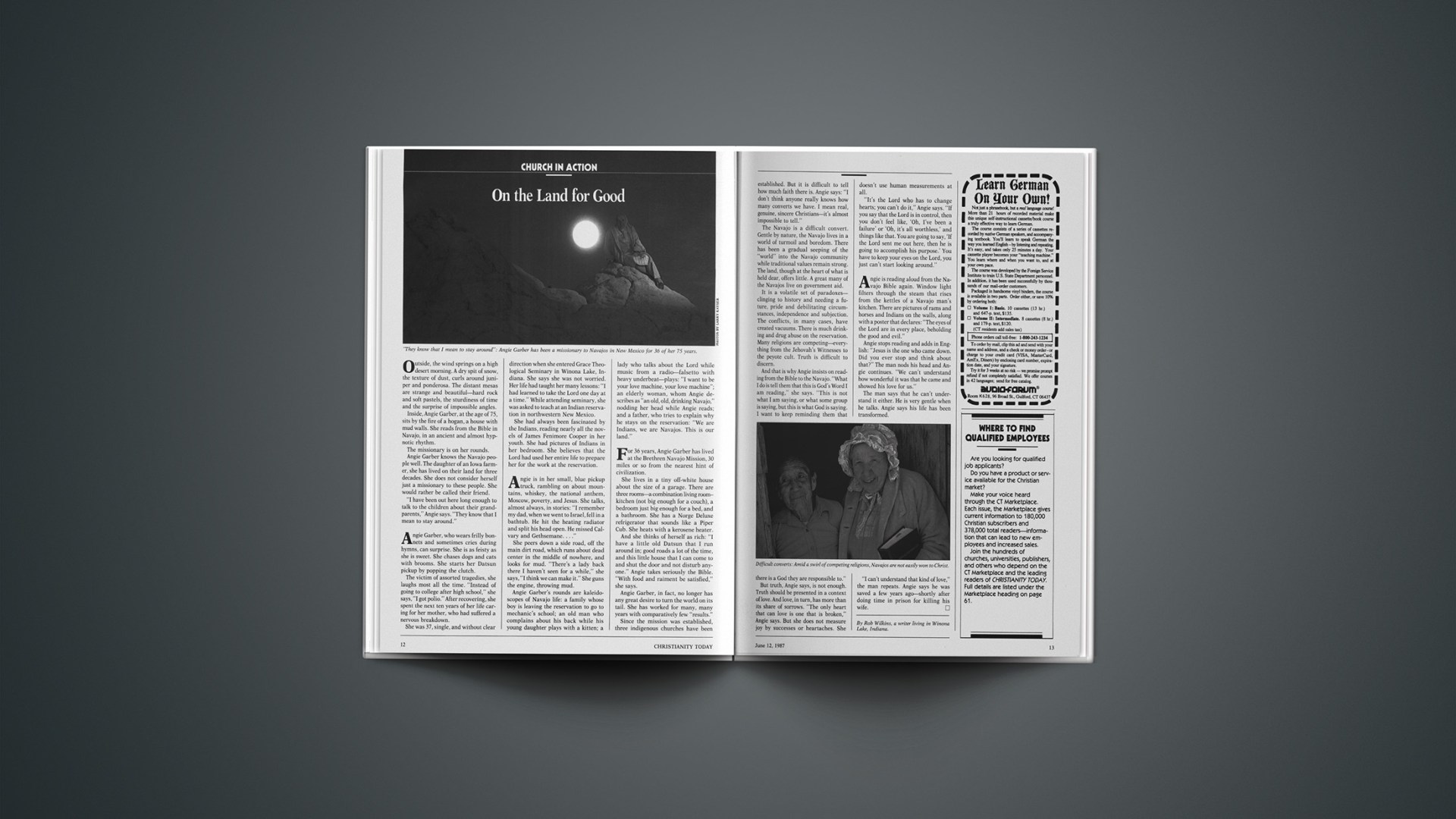Outside, the wind springs on a high desert morning. A dry spit of snow, the texture of dust, curls around juniper and ponderosa. The distant mesas are strange and beautiful—hard rock and soft pastels, the sturdiness of time and the surprise of impossible angles.
Inside, Angie Garber, at the age of 75, sits by the fire of a hogan, a house with mud walls. She reads from the Bible in Navajo, in an ancient and almost hypnotic rhythm.
The missionary is on her rounds.
Angie Garber knows the Navajo people well. The daughter of an Iowa farmer, she has lived on their land for three decades. She does not consider herself just a missionary to these people. She would rather be called their friend.
“I have been out here long enough to talk to the children about their grandparents,” Angie says. “They know that I mean to stay around.”
Angie Garber, who wears frilly bonnets and sometimes cries during hymns, can surprise. She is as feisty as she is sweet. She chases dogs and cats with brooms. She starts her Datsun pickup by popping the clutch.
The victim of assorted tragedies, she laughs most all the time. “Instead of going to college after high school,” she says, “I got polio.” After recovering, she spent the next ten years of her life caring for her mother, who had suffered a nervous breakdown.
She was 37, single, and without clear direction when she entered Grace Theological Seminary in Winona Lake, Indiana. She says she was not worried. Her life had taught her many lessons: “I had learned to take the Lord one day at a time.” While attending seminary, she was asked to teach at an Indian reservation in northwestern New Mexico.
She had always been fascinated by the Indians, reading nearly all the novels of James Fenimore Cooper in her youth. She had pictures of Indians in her bedroom. She believes that the Lord had used her entire life to prepare her for the work at the reservation.
Angie is in her small, blue pickup truck, rambling on about mountains, whiskey, the national anthem, Moscow, poverty, and Jesus. She talks, almost always, in stories: “I remember my dad, when we went to Israel, fell in a bathtub. He hit the heating radiator and split his head open. He missed Calvary and Gethsemane.…”
She peers down a side road, off the main dirt road, which runs about dead center in the middle of nowhere, and looks for mud. “There’s a lady back there I haven’t seen for a while,” she says, “I think we can make it.” She guns the engine, throwing mud.
Angie Garber’s rounds are kaleidoscopes of Navajo life: a family whose boy is leaving the reservation to go to mechanic’s school; an old man who complains about his back while his young daughter plays with a kitten; a lady who talks about the Lord while music from a radio—falsetto with heavy underbeat—plays: “I want to be your love machine, your love machine”; an elderly woman, whom Angie describes as “an old, old, drinking Navajo,” nodding her head while Angie reads; and a father, who tries to explain why he stays on the reservation: “We are Indians, we are Navajos. This is our land.”
For 36 years, Angie Garber has lived at the Brethren Navajo Mission, 30 miles or so from the nearest hint of civilization.
She lives in a tiny off-white house about the size of a garage. There are three rooms—a combination living room-kitchen (not big enough for a couch), a bedroom just big enough for a bed, and a bathroom. She has a Norge Deluxe refrigerator that sounds like a Piper Cub. She heats with a kerosene heater.
And she thinks of herself as rich: “I have a little old Datsun that I run around in; good roads a lot of the time, and this little house that I can come to and shut the door and not disturb anyone.” Angie takes seriously the Bible. “With food and raiment be satisfied,” she says.
Angie Garber, in fact, no longer has any great desire to turn the world on its tail. She has worked for many, many years with comparatively few “results.”
Since the mission was established, three indigenous churches have been established. But it is difficult to tell how much faith there is. Angie says: “I don’t think anyone really knows how many converts we have. I mean real, genuine, sincere Christians—it’s almost impossible to tell.”
The Navajo is a difficult convert. Gentle by nature, the Navajo lives in a world of turmoil and boredom. There has been a gradual seeping of the “world” into the Navajo community while traditional values remain strong. The land, though at the heart of what is held dear, offers little. A great many of the Navajos live on government aid.
It is a volatile set of paradoxes—clinging to history and needing a future, pride and debilitating circumstances, independence and subjection. The conflicts, in many cases, have created vacuums. There is much drinking and drug abuse on the reservation. Many religions are competing—everything from the Jehovah’s Witnesses to the peyote cult. Truth is difficult to discern.
And that is why Angie insists on reading from the Bible to the Navajo. “What I do is tell them that this is God’s Word I am reading,” she says. “This is not what I am saying, or what some group is saying, but this is what God is saying. I want to keep reminding them that there is a God they are responsible to.”
But truth, Angie says, is not enough. Truth should be presented in a context of love. And love, in turn, has more than its share of sorrows. “The only heart that can love is one that is broken,” Angie says. But she does not measure joy by successes or heartaches. She doesn’t use human measurements at all.
“It’s the Lord who has to change hearts; you can’t do it,” Angie says. “If you say that the Lord is in control, then you don’t feel like, ‘Oh, I’ve been a failure’ or ‘Oh, it’s all worthless,’ and things like that. You are going to say, ‘If the Lord sent me out here, then he is going to accomplish his purpose.’ You have to keep your eyes on the Lord, you just can’t start looking around.”
Angie is reading aloud from the Navajo Bible again. Window light filters through the steam that rises from the kettles of a Navajo man’s kitchen. There are pictures of rams and horses and Indians on the walls, along with a poster that declares: “The eyes of the Lord are in every place, beholding the good and evil.”
Angie stops reading and adds in English: “Jesus is the one who came down. Did you ever stop and think about that?” The man nods his head and Angie continues. “We can’t understand how wonderful it was that he came and showed his love for us.”
The man says that he can’t understand it either. He is very gentle when he talks. Angie says his life has been transformed.
“I can’t understand that kind of love,” the man repeats. Angie says he was saved a few years ago—shortly after doing time in prison for killing his wife.
By Rob Wilkins, a writer living in Winona Lake, Indiana.










